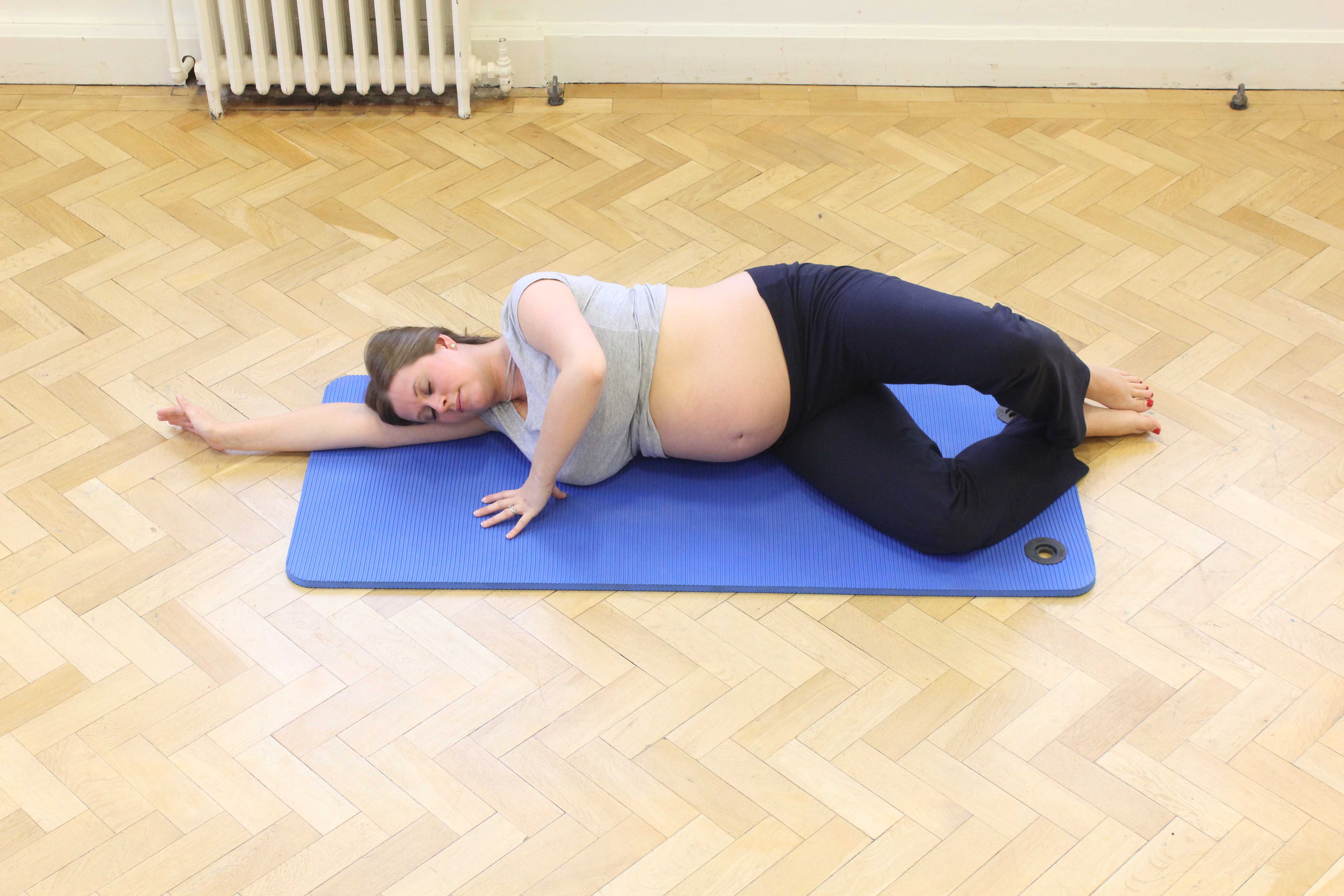In PGP, the joints that can be affected include;
- Symphysis pubis joint (SPJ) at the front of the pelvis
- Hip joint
- Sacroiliac joint (SIJ) at the back
The specialist physiotherapists at Physio.co.uk will devise a programme to treat the whole pelvis as opposed to just managing one specific joint that is thought to be causing the pain. This will give you the best possible outcome.
Approximately 1 in 5 women experience PGP during pregnancy and usually the symptoms disappear after a few days. However, if the symptoms are more severe, you may need additional assistance and could benefit from a physiotherapy programme to help reduce your pain. Physio.co.uk have physiotherapists that specialise in women’s health physiotherapy and can work with you to devise an individualised programme throughout your pregnancy.
 Above: Performing clam exercises to improve tone and stability in the hips and pelvis
Above: Performing clam exercises to improve tone and stability in the hips and pelvisSymptoms of pregnancy related PGP
Women can experience a range of different symptoms that are associated with PGP and your physiotherapist at Physio.co.uk will be able to create a treatment plan that is specific to any of the symptoms.
- Pain over the pubic bone or below the abdomen
- Low back pain
- Discomfort or pain in the groin area
- Problems when walking
- A ‘clicking’ sound in the pelvic region
- Pain when standing on one leg such as when undressing
- Difficulty getting in/out of the car and or bath
- Problems lying on your side or back
- Difficulties during sexual intercourse
Why might I experience pregnancy related PGP?
Often there is no specific cause of PGP, other times it may be a combination of reasons including:
- Instability in any of the pelvic joints
- Weakness in the surrounding muscles including pelvic floor, hip, lower back an stomach muscles
- Past trauma of the pelvis
- Multiple pregnancies
- Overweight
- A manual job
- Hypermobility (joints are more mobile than they should be) in other joints in the body
- Diastasis symphysis pubis (DSP). This is when the joint at the front of the pelvis (symphysis pubis joint) separates more than normal during labour.
What will my physiotherapy include?
Whatever the reason for pregnancy related PGP, it is important that you receive advice on treating and managing the condition as soon as possible. Physio.co.uk have specialist women’s health physiotherapists that will carry out a comprehensive assessment and create a treatment plan to help minimise your symptoms as much as possible. Potential physiotherapy treatment may include:
Advice
- Pacing advice about the importance of getting the correct balance between activity and rest
- Advice on how best to carry out your normal activities of daily living including getting dressed and housework
- Practice of the most appropriate and comfortable positioning techniques and how to transfer from one position to another
- A complete stair assessment and advice on how best to manage getting up and down the stairs
- Teaching of using your crutches if necessary
- Lifting and handling techniques
- Advice regarding the best labour positions
- Providing you with any additional equipment that you may find useful including pelvic support belts and adaptations for your home
- Relaxation techniques
Treatment
There are various physiotherapy treatment options to treat your PGP. Your physiotherapist at Physio.co.uk will work with you to devise the most appropriate physiotherapy programme. Physiotherapy may include:
- Pain control modalities including TENS
- Gentle mobilisations around the spine, hip and pelvis joints to regain the correct movement and alleviate pain
- Strengthening exercises for the stomach, back, hip and pelvis muscles to encourage improved support for these joints
- Lower back mobility exercises
- Pelvic stability exercises
- Pelvic floor exercises
- Hydrotherapy
- Soft tissue techniques to loosen any muscles that may be tight
- Cardiovascular activity such as walking, cycling and swimming
Summary
Pregnancy related pelvic girdle pain (PGP) (originally known as symphysis pubis dysfunction) is pain in the one or more of the pelvic joints which may refer to other areas of the pelvis, hip or lower back regions. It is important to receive an accurate diagnosis of the condition and get advice on how best to manage PGP as early as possible. The specialist physiotherapists at Physio.co.uk will be able to provide you with a thorough assessment and treatment plan to help optimise your recovery and reduce your pain during pregnancy. Please call Physio.co.uk on 0330 088 7800 to arrange an appointment today, or you can also book online today!

 0330 088 7800
0330 088 7800





































